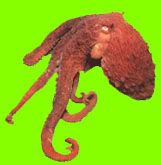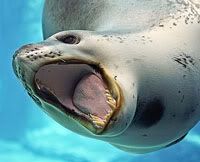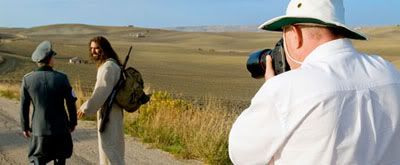 The Giant Pacific Octopus (Enteroctopus dofleini) is not an animal that I'd given any thought to before, but after it's all-too-brief appearance on the Open University documentary Life, which aired on BBC1 tonight, I've thought of little else. (The pic, to the right, is from the Royal BC Museum in Canada, photographed by Jim Cosgrove.)
The Giant Pacific Octopus (Enteroctopus dofleini) is not an animal that I'd given any thought to before, but after it's all-too-brief appearance on the Open University documentary Life, which aired on BBC1 tonight, I've thought of little else. (The pic, to the right, is from the Royal BC Museum in Canada, photographed by Jim Cosgrove.) Other animals featured in this first instalment - called Challenges of Life. There were three cheetah bringing down an ostrich, and a grasshopper that presumably thought things were bad enough when it was caught on a spider's web before a toad's tongue sucked it off. And, in a mammoth 3-month operation involving HMS Endurance, Antarctic sailor Jérôme Poncet in the Golden Fleece and veteran wildlife film-maker Doug Allan off Rosenthal Island, a leopard seal, with teeth bigger th
Other animals featured in this first instalment - called Challenges of Life. There were three cheetah bringing down an ostrich, and a grasshopper that presumably thought things were bad enough when it was caught on a spider's web before a toad's tongue sucked it off. And, in a mammoth 3-month operation involving HMS Endurance, Antarctic sailor Jérôme Poncet in the Golden Fleece and veteran wildlife film-maker Doug Allan off Rosenthal Island, a leopard seal, with teeth bigger th an a lion's and jaws that can open 180°, flaying a penguin chick mouthful by mouthful (which left Allan exhilarated at catching some action at last but sad to see the chick's fate).
an a lion's and jaws that can open 180°, flaying a penguin chick mouthful by mouthful (which left Allan exhilarated at catching some action at last but sad to see the chick's fate).What caught my attention about the mother Giant Pacific Octopus is the devotion (that word being used by Attenborough) with which it tends the eggs wherein tiny octopi mature. Blockading herself into an underwater cavern, she blows water over the eggs even as she starves, and expires shortly after her hatchlings swim away.
I don't predicate any knowledge of sacrifice of the Giant Pacific, any more than I do intention to bring a crisis to Christianity of the Ichneumonidae, no matter how many times Richard Dawkins gleefully recounts the wasps' method of using a paralysed caterpillar to bring up baby.
But it seemed the closest thing to altruism I've seen in the animal kingdom yet. Possibly Attenborough's foreseeing the anthropomorphic temptation was the reason he injected a note of caution into his avuncular narration to remind us that surviving long enough to pass on our genes is "ultimately...what life is all about".
In a way, he has a point. There would be no point in Mrs Giant Pacific embarking on her epic fast without her youngsters in their eggs beneath her.
But what of altruism after one's progeny has entered the picture - is it then no longer possible? Many human mothers (and fathers) make sacrifices for their children that the childen would survive perfectly without - but they do it for love. The sacrifices kids appreciate most aren't the ones that result in ostentatious presents they can show-off at school for a couple of days, but rather involve the parent's time that could so easily be spent in a number of other places both physical and mental.
 On the other hand, there are things that look like altruism which are anything but - take Hilary Clinton's visit to the Stormont estate in Belfast yesterday. Giving Unionist members of the Northern Ireland assembly a barracking about ending the impasse over further devolution of the police force won't do her standing any harm in the eyes of those of her Democrat supporters who would always put a coin in the NORAID can, while Sinn Féin, whose voters have to live with the realities caused by volatile horse-trading, called for loyalists to be given time to think.
On the other hand, there are things that look like altruism which are anything but - take Hilary Clinton's visit to the Stormont estate in Belfast yesterday. Giving Unionist members of the Northern Ireland assembly a barracking about ending the impasse over further devolution of the police force won't do her standing any harm in the eyes of those of her Democrat supporters who would always put a coin in the NORAID can, while Sinn Féin, whose voters have to live with the realities caused by volatile horse-trading, called for loyalists to be given time to think.At the end of the original version of The Selfish Gene, Richard Dawkins writes that "we can...discuss ways of deliberately cultivating and nurturing pure, disinterested altruism - something that has no place in nature, something that has never existed before in the whole history of the world".
Maybe he's been meditating on the life and death of arthropods for too long. For altruism, don't look at politicians, or even at poor Mama octopus; look at, say, a tired mother taking delighted children out to learn about toadstools, or Dad making time after his nightshift to see the kids before they go to school. Or, indeed, any of many possible examples of going the extra mile.

*I originally referred to the cephalopods of the title as "octopi" but was taken to task by Professor Calculus, who reminded me of the word's Greek uses and presented me with the options of "octopodes" or the anglicised "octopuses"; I chose the former.











EVERY moment is a teaching moment.
ReplyDeleteSeems there's a spider that stays behind for her young to feed off her (still living) body, but I forget which kind.
ReplyDeleteI've heard of that but, like you, I can't put a name to the beastie.
ReplyDeletemy children like watching bats in the summer evenings.... yes bats... no fairgrounds, no computer games... just bats, woods and the good old outdoors. Anyone who would wish to challenge my mothering abilities because my children have a vested interest in these things , please feel free........ and money is not an issue when it comes to mothering. Love , nourishment and fresh air is the best thing a child could ever have in life.
ReplyDeleteWell said!
ReplyDelete